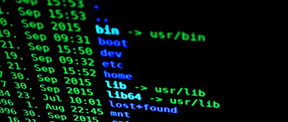**Exploring the Obscure Realm of Linux: The locate Command**
In the vast and complex world of Linux, countless commands reside, each serving a specific purpose. One such command, often overlooked or forgotten, is locate. This unassuming utility plays a crucial role in quickly searching for files and directories within the file system.
**What is locate?**
Locate is a powerful command that indexes all the files and directories on your system and stores a database with their locations. This database is updated regularly, typically on a daily or weekly basis, using the updatedb command.
**How to Use locate**
Using locate is straightforward. Simply type locate followed by the search term you wish to find, as shown below:
“`
$ locate keyword
“`
For example, to search for all files containing the word “example,” use the following command:
“`
$ locate example
“`
Locate will display a list of all the files and directories that contain the specified search term. Each line in the output represents one matching item.
**Example Uses of locate**
While the locate command is not mentioned in the tree command, it offers several useful applications:
* **Find Recently Modified Files:** By combining locate with the -mtime option, you can quickly find files that have been modified within a specified number of days or minutes. For instance, to find files modified within the last hour, use:
“`
$ locate -mtime -1
“`
* **Search for Hidden Files:** The -a option in locate allows you to search for hidden files, which are typically prefixed with a dot (.). This can be useful for uncovering malicious or hidden files that may compromise your system.
“`
$ locate -a .conf
“`
* **Find Large Files:** To identify files that consume excessive storage space, use the -size option in locate. For example, the following command searches for files larger than 10MB:
“`
$ locate -size +10M
“`
* **Locate Specific File Types:** You can narrow down your search by specifying the file type using the -type option. For instance, to search for all PDF files, use:
“`
$ locate -type f | grep .pdf
“`
**Limitations of locate**
While locate is a powerful tool, it has its limitations:
* **Slow on Large Systems:** On systems with millions of files, locate can take a long time to search the database.
* **Not Real-Time:** The locate database is periodically updated, so it may not reflect the most recent changes to the file system.
* **Not Searchable by File Contents:** Locate can only search file and directory names, not their contents. For content-based searches, consider using the find or grep commands.
**Conclusion**
The locate command is a versatile tool for quickly finding files and directories on your Linux system. Its powerful filtering capabilities and ease of use make it indispensable for system administrators, developers, and anyone looking to navigate the depths of their file system efficiently.
